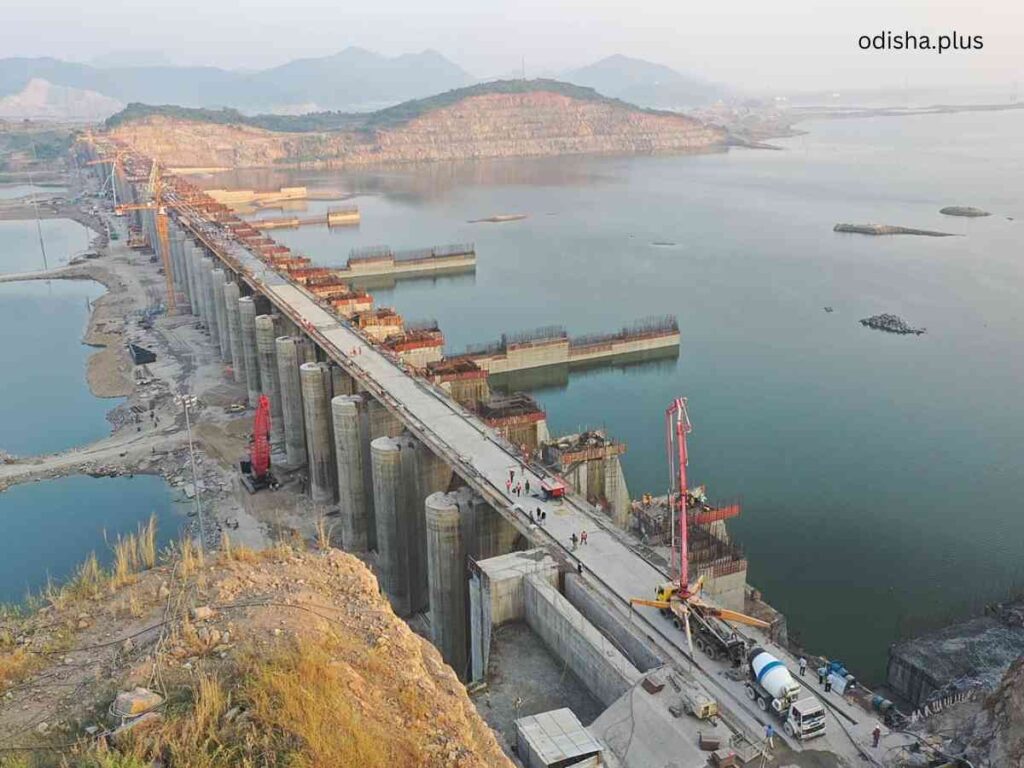Odisha has locked horns over river water with multiple neighboring states. What are the specifics of these conflicts, and what is their current status? This will be explored in a three-part series
OdishaPlus Bureau

The Polavaram conflict involves various disputes and tensions related to the Polavaram Irrigation Project, a significant multi-purpose dam being built on the Godavari River in Andhra Pradesh.
Proposed in 1941 and officially recognized as a national project in 2014 under the Andhra Pradesh Reorganisation Act, this initiative aims to provide irrigation, hydropower, and drinking water while facilitating river interlinking. However, it has sparked significant debate due to its social, environmental, and interstate implications.
The project is expected to displace over 100,000 individuals, including many tribal groups, such as the Konda Reddis and Koyas, across more than 370 villages in Andhra Pradesh. Additionally, the reservoir’s backwaters will inundate regions in Telangana, Odisha, and Chhattisgarh, impacting forest communities and their means of survival.
Critics contend that the rehabilitation and resettlement (R&R) efforts have been insufficient, with only a small portion completed despite advancements in dam construction. Tribal families have experienced forced evictions, inadequate compensation, and moves to locations lacking forest access, which is essential for their survival.
The project has sparked conflicts with nearby states, too. Odisha is against it because it may flood tribal lands in the Malkangiri district. The Biju Janata Dal government supported the rights of the impacted communities. Chhattisgarh is concerned about potential flooding and displacement in its border areas. Telangana is worried about the flooding of villages in the Khammam district and is calling for public hearings and improved protection.
Several states have taken their concerns to the Supreme Court, claiming that Andhra Pradesh’s implementation of the project breaches interstate agreements, including the 1980 Godavari Water Disputes Tribunal (GWDT) ruling, which required protective measures like embankments.
Environmentalists are raising alarms about the project’s effects on biodiversity, particularly the flooding of areas within Papikonda National Park, historical sites, and forests. The construction of the dam has also been associated with a higher risk of flooding, as demonstrated in 2022 when backwaters from a cofferdam inundated tribal communities. The project has encountered delays due to changes in political leadership, funding conflicts, and administrative challenges.
In 2019, the Andhra Pradesh government, led by Y.S. Jagan Mohan Reddy tried to cancel its contract with Navayuga Engineering, but this decision was later overturned by the High Court.
Chief Minister N. Chandrababu Naidu, who renewed his efforts in 2024, has accused the previous government of mishandling finances, claiming that costs rose from ₹16,010 crore to over ₹57,940 crore. Although the central government increased its funding to ₹15,000 crore in 2024, state leaders consider this amount inadequate.
Since 2005, tribal communities, with support from local groups like the Andhra Pradesh Girijana Sangham and the Godavari Basic Action Group, have been protesting against displacement and advocating for fair rehabilitation and resettlement.
Their demonstrations have included rallies, road blockades, and symbolic actions such as burning effigies, often resulting in arrests and crackdowns. The participation of these organizations highlights a lack of trust in elected officials, who are perceived as focusing more on political interests than on the needs of the tribal population.
The government of Andhra Pradesh, under Naidu’s leadership, aims to finish the project by 2026, intending to resettle 38,060 displaced families by June of that year. However, there is ongoing opposition from affected states and communities, along with legal disputes in the Supreme Court.
Although the dam is expected to irrigate more than 436,000 hectares and produce 960 MW of hydropower, the advantages are debated due to the associated human and environmental costs.
When the Biju Janata Dal was in power, it organized protests urging the Andhra Pradesh government to be open about project details. They demanded assurances of compensation for families affected by the project and the construction of embankments to protect vulnerable areas in Odisha. Party leaders have noted that there has been a lack of adequate public discussions regarding the potential impacts of the project.
With Chandrababu Naidu emerging as a key ally following the 2024 elections and the Modi government relying on the Telugu Desam, it appears that Odisha’s position on Polavaram has weakened.




























